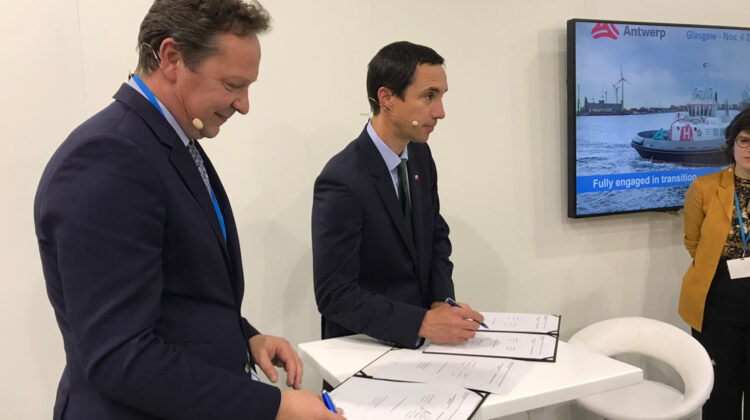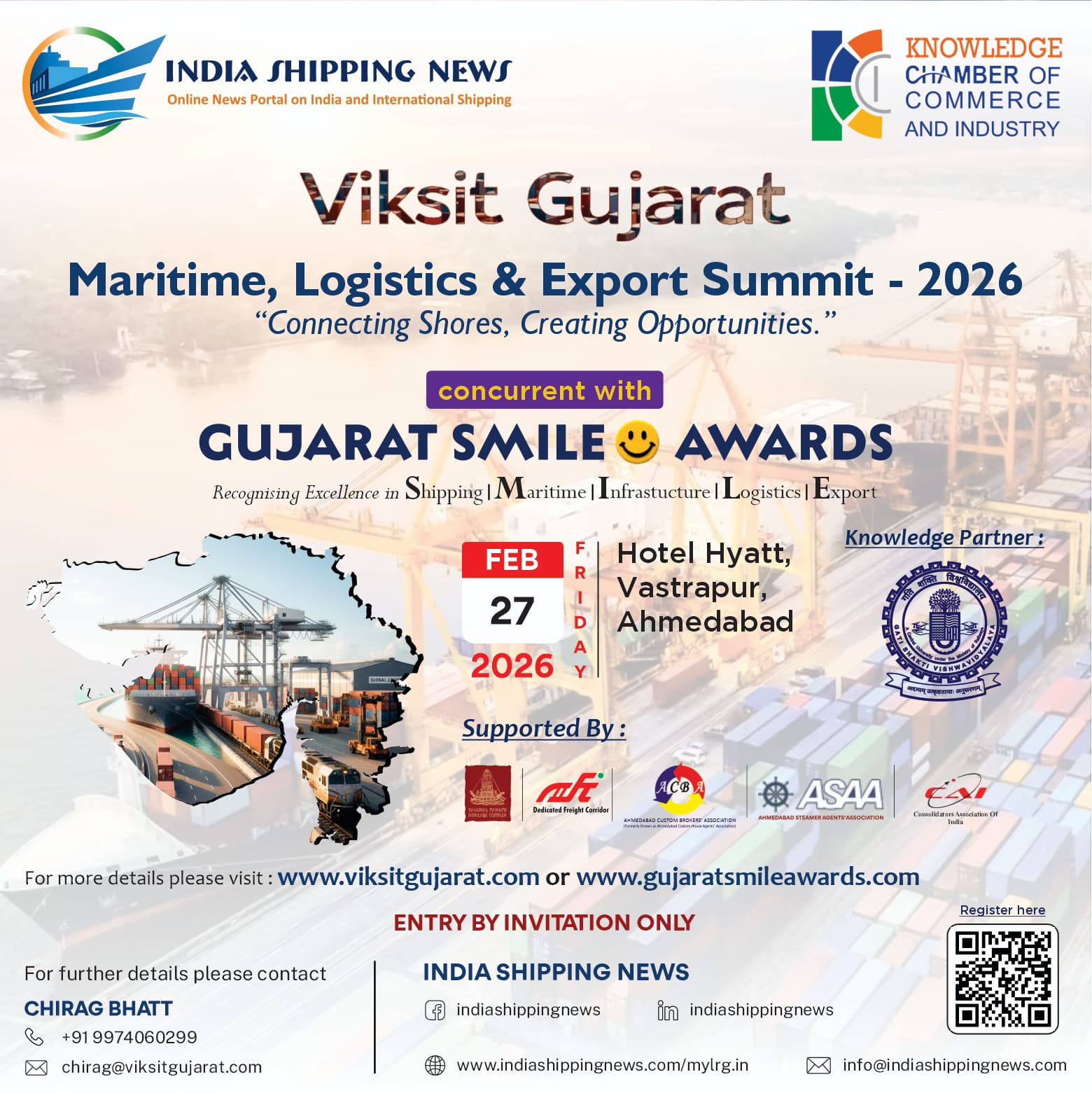
Port of Antwerp, Port of Zeebrugge and Chile join forces to promote hydrogen production

ANTWERP : On November 4, the Port of Antwerp, Port of Zeebrugge and the Chilean Ministry of Energy signed a Memorandum of Understanding (MoU) joining forces to make green hydrogen flows between Chile and Western Europe a reality . This cooperation will remove the last barriers and gaps in the run-up to the effective start-up of green production, setting up the logistics chain between the continents and logistics in the Belgian seaports and their hinterland.
The Belgian ports and Chile will sign a Memorandum of Understanding (MoU) during the COP26 climate conference in Glasgow and will collaborate intensively to make green hydrogen flows between the continents a reality.
In the MoU, signed on Energy Day during the COP26 summit in Glasgow, the various parties express their interest in working together on the important strategic issue of establishing a corridor between their countries for the transport of green hydrogen or derivatives, produced in Chile and received in Belgian ports, for onward distribution to meet expected demand in Europe. The signing of the MoU took place after a debate on hydrogen imports between Sébastien Arbola (Executive Vice President, ENGIE), Tom Hautekiet (CEO, Port of Zeebrugge), Juan Carlos Jobet (Chilean Minister of Energy) and Tine Van der Straeten (Belgian Minister of Energy), and was moderated by Noam Boussidan (Lead Energy, World Economic Forum).
Two major European energy hubs
Port of Antwerp, Europe’s largest port in terms of size and integrated chemical cluster activities, and Port of Zeebrugge, Belgium’s most important LNG hub and offshore wind power plant, play an important role as fossil energy hubs for Western Europe. They receive, store and send significant amounts of energy to consumers of electricity, heat, chemicals and transport. Port of Antwerp and Port of Zeebrugge aim to be part of the Belgian and European climate solution by acting as “early mover” hubs for renewable energy, leveraging their infrastructure, know-how and network to import and deploy significant volumes of hydrogen in the European hinterland.
Both ports are convinced that the future Western European energy system will have to focus on domestic wind and solar energy, as well as on imported quantities of renewable hydrogen. They believe that hydrogen carriers will be the appropriate form of energy to enable the transition in sectors such as maritime shipping, chemicals and fuel and steam production. Hence their role as a key player in the Hydrogen Import Coalition, which aims to bring together public and industry partners to gain all the system insights needed to take the right actions, said Jacques Vandermeiren, CEO Port of Antwerp: ”
When we look back on the impact of COP26, I very much hope that we will call the conference “the climate action summit”. The summit where promises were made and fulfilled. That is the only way we meet this challenge by saying what we do and doing what we say At Port of Antwerp we will continue to push through our ambitions to make our entire fleet environmentally friendly and to develop further as a multi-fuel port, offering the alternative fuels that sustainable shipping is required.” Tom Hautekiet, CEO of the Port of Zeebrugge: ”
We are proud that Chile, the main potential exporter of green molecules, wants to collaborate with the ports of Antwerp and Zeebrugge. This opportunity will enable us to fulfill our shared ambition to The fact that they regard Zeebrugge as a suitable port of entry confirms our position as an important energy hub. Moreover, our close cooperation will open a new chapter for the energy transition in and of Europe.”
Chile’s ambitious energy plan
Chile, through its National Green Hydrogen Strategy, has set very ambitious targets to become a carbon neutral country by 2050, leveraging the high-quality and abundant renewable energy resources it has at its disposal. The country aims to produce the cheapest green hydrogen by 2030 and to be among the top 3 exporters of green hydrogen by 2040. The Chilean Ministry of Energy, which leads the strategic green hydrogen policy, should work with overseas parties to establish international green hydrogen supply chains from Chile. The signing of this memorandum is a further step towards fulfilling their sustainability commitments.Juan Carlos Jobet (Chilean Minister of Energy): “This is excellent news to further consolidate Chile’s leading position in the development of this new industry. With the clean energy potential we have, we will be able to become the cheapest green hydrogen producers in the world, not only meeting our own demand but also helping other countries achieve their climate goals. .”
A decisive collaboration for the future of green hydrogen
Port of Antwerp, Port of Zeebrugge and the Ministry of Chile will work together on a regular basis to exchange knowledge, experiences and other information to further explore the possibilities for cooperation. The latter is particularly important in meeting the challenges in the run-up to the effective start-up of green production in Chile, the set-up of the logistics chain between our continents and logistics in the Flemish seaports and their hinterland.Port alderman Annick De Ridder: “Together with industry, the ports play an important role in finding solutions for our climate. That is why the agreement between the ports of Antwerp and Zeebrugge and the country of Chile is an important milestone in the fight against climate change, whereby sustainable energy flows are made more accessible in Europe. As the port of Antwerp, we are therefore delighted with this agreement and further anchor our position as a sustainable energy hub in Europe.”Dirk De fauw, Mayor of Bruges: “Signing the letter of intent will certainly open new doors for the ports of Zeebrugge and Antwerp. The green hydrogen produced in Chile in the coming years will be used in the first place. for domestic consumption, but there are concrete plans to export the green hydrogen to other parts of the world as well, making Zeebrugge the hub for the supply of green hydrogen in Western Europe.This element of cooperation was already discussed in detail during the merger negotiations with the port of Antwerp: Port of Antwerp Bruges as a green energy hub of the future.”
ENGIE, partner of the Hydrogen Import Coalition with a historic presence and long-standing expertise in both Belgium and Chile – key countries for the Group – aims to develop renewable energy and develop projects to start up the import chain of renewable molecules between the two countries.Catherine MacGregor, CEO of ENGIE: “Convinced that green hydrogen will play a key role in making our economies carbon neutral, we are very proud to support the hydrogen import program and to work with Belgium and Chile. To develop 4GW of renewable hydrogen capacity globally by 2030, the Group is perfectly positioned to support these two countries in developing an ambitious hydrogen industry and achieving their net-zero targets.”

